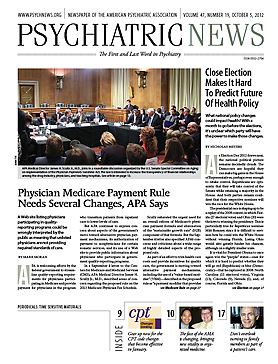It was not long ago that psychologist Anne Pidano, Ph.D., and her colleagues lamented the challenges that pediatric primary care clinicians face when assessing and managing children with mental health concerns. These challenges include lack of time, lack of training, and lack of mental health specialists to whom they can refer their patients, they pointed out in the June 2011 Families, Systems, and Health.
Now Pidano and Lisa Honigfeld, Ph.D., have addressed some of those challenges through a review of the literature on patterns of psychotropic medication prescribing for children and adolescents and the role of pediatric primary care providers online July 15 in Psychiatric Services in Advance. Pidano is an assistant professor in the Department of Psychology at the University of Hartford, and Honigfeld is the vice president for health initiatives at the Child Health and Development Institute of Connecticut.
“It is well documented that approximately 20 percent of children in the United States have behavioral health issues, that approximately one-quarter to one-half of all pediatric primary care office visits involve psychosocial concerns, and that most children who experience psychosocial issues seek treatment in primary care settings,” they pointed out. They also noted evidence that pediatric primary care providers write as many as 85 percent of prescriptions for psychotropic medications used to treat children and adolescents.
Pidano and Honigfeld addressed several aspects of pediatric psychopharmacology, including data describing the percentage of children and adolescents taking psychotropic medications and the disorders for which those medications were prescribed.
Their examples included a 2010 report in the Journal of the American Academy of Child and Adolescent Psychiatry in which Comer and colleagues reported that 8.8 percent of office-based visits for children aged 6 to 17 involved a prescription for one of five types of psychotropic medications, and a 2007 Current Medical Research and Opinion study in which Aparasu and Bhatara reported that 1 percent (approximately 2 million) of office visits by children and adolescents in 2003 and 2004 involved prescriptions for antipsychotic medications, primarily second-generation antipsychotics, most frequently risperidone.
They also described two statewide models developed to improve primary care providers’ ability to treat young patients with mental health needs—including prescribing psychotropic medications—by linking them to support from child mental health practitioners, models they said demonstrated one solution to improving quality of care for this population.
The Massachusetts Child Psychiatry Access Project (MCPAP) grew out of an earlier project known as Targeted Child Psychiatric Services, which provided telephone consultation and support to primary care providers by child psychiatrists.
The MCPAP has been fully financed since its inception in 2005 by $3.2 million in funds allocated annually by the Massachusetts legislature to the Department of Mental Health. The program consists of six regional teams made up of child psychiatrists, licensed mental health care providers, and care coordinators. All of them provide support to the pediatric primary care providers, who provide a substantial amount of the mental health services themselves.
The second program described by Pidano and Honigfeld is Washington state’s Partnership Access Line (PAL).
Launched in 2008, PAL was originally meant to duplicate the MCPAP, the authors explained, but has been modified to address contextual differences, including the larger geographic area of the state and the population distribution. The PAL program also differs from the one in Massachusetts in that although PAL telephone services are available to clinicians who treat all children, the program focuses on children insured by Medicaid.
“In summary, Massachusetts and Washington have used policy and system reform to develop statewide strategies to enable improved comanagement of medications between psychiatrists and pediatric primary care providers,” wrote the researchers, who cautioned that continued and increasingly rigorous evaluation of the programs is necessary before more confident assertions can be made about their impact and effectiveness.
“Consultation, collaboration, and comanagement are promising approaches to improving the prescription and management of psychotropic medication for children and therefore need further study,” they concluded.


